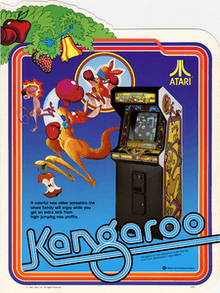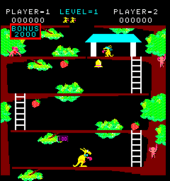Kangaroo (video game)
Kangaroo (Japanese: カンガルー) is a four-screen platform game released in arcades in 1982 by Sun Electronics and distributed in North America by Atari, Inc.[1] Kangaroo is one of the first arcade games similar in style to Donkey Kong without being a direct clone. The player takes the role of a boxing glove-wearing mother kangaroo who is trying to rescue her child from fruit-throwing monkeys.
| Kangaroo | |
|---|---|
 North American arcade flyer | |
| Developer(s) | Sun Electronics GCC (5200) |
| Publisher(s) | Sun Electronics Atari, Inc. |
| Platform(s) | Arcade, Atari 8-bit, Atari 2600, Atari 5200, Nintendo Switch, PlayStation 4 |
| Release | 1982: Arcade 1983: 2600, 5200, Atari 8-bit |
| Genre(s) | Platform |
| Mode(s) | Up to 2 players, alternating turns |
| Cabinet | Upright |
| CPU | 1 × Z80 @ 2.5 MHz |
| Sound | 1 × Z80 @ 2.5 MHz 1 × AY-3-8910 @ 1.25 MHz |
| Display | Raster, 240 x 256 pixels (Vertical), 24 colors |
Despite featuring jumping, there is no jump button. Instead, the player pushes up on the joystick—or up and diagonally—to jump.
Gameplay

There are four different levels. Three of them consist of the mother kangaroo on the bottom floor trying to reach the top floor where her joey is being held captive by some monkeys. On each of the levels monkeys throw apples which the mother kangaroo must either jump, duck, or punch. If she gets face to face with one of the monkeys, she can punch the monkey with a boxing glove. There are also pieces of fruit that she can jump up and get for points; if she jumps and touches a bell, more fruits will appear to replace the ones she has already collected. She must be wary of the big Ape, who will occasionally appear and try to take her gloves away from her. The level must be completed before the time runs out; otherwise, the player will lose a life.
Levels 1, 2 and 4 consist of different platforms that the mother kangaroo must jump onto or climb onto via a ladder. On the third level, the joey is in a cage held up by a troop of monkeys, and there is a horde of apples that will be unleashed if five monkeys climb up to it. On this level, the mother kangaroo must punch each monkey in the stack several times until the cage is lowered and, when the cage has been lowered enough, the mother kangaroo must climb to the next floor to get to the joey before the cage is raised again.
Kangaroo has a number of clearly visible glitches in the graphics, such as sprites briefly flickering.[2]
The game uses classical and folk songs, including "American Patrol" by F. W. Meacham (during regular gameplay), "Oh! Susanna" by Stephen Foster[3] (level completion fanfare), and "Westminster Quarters" (when a bell is rung).
Ports
Atari, Inc. published ports of Kangaroo for the Atari 2600 and Atari 5200 in 1983. The Atari 5200 version was contracted out to General Computer Corporation.
Jim Leiterman of Atari Research ported the Atari 5200 cartridge to the Atari 8-bit family in one day. He used a tool he had written to disassemble the game code,[4] then modified the source and assembled an Atari 8-bit version. Leiterman submitted it to the Atari Program Exchange and requested they publish it without attribution. This was unusual, as APX was created to publish user-written software, not licensed ports or software developed internally at Atari.
The original arcade version was made available on home systems for the first time on July 16, 2020 as part of Hamster Corporation's Arcade Archives series. It was released digitally on Nintendo Switch and PlayStation 4.[5]
Reception
Arcade Express gave the arcade version an 8 out of 10 in November 1982.
The Atari 5200 version of Kangaroo was reviewed by Video magazine in its "Arcade Alley" column where it received mixed commentary. While describing the game as "an excellent piece of work", reviewers also admitted that it had "fail[ed] to bowl [them] over" and criticized the game's "animation-quality graphics" which appeared to be used primarily to "dress up rudimentary play-action".[6]:39 It was later awarded "1984 Best Arcade-to-Home Video Game/Computer Game Translation" at the 5th annual Arkie Awards, where judges noted that "all aspects of the game look and play" as a "virtual duplicate" of the arcade version.[7]:29
Charles Ardai, reviewing the Atari 2600 version for Electronic Fun with Computers & Games, wrote "even though the graphics and sound are generally horrible, the gameplay is many times better than in the arcades."[8]
Legacy
In 1984, Kangaroo and Space Ace replaced Pitfall Harry, Frogger, and Donkey Kong Jr. in CBS's Saturday Supercade. The cartoon revolves around kangaroos Katy (voiced by Mea Martineau) and Joey (voiced by David Mendenhall) who live in a zoo run by the zookeeper Mr. Friendly (voiced by Arthur Burghardt). The series has never been officially released on DVD or VHS.[9]
References
- "Overseas Readers Column: Sun , Atari Game Pact On "Kangaroo" Video - For W.Germany Sun Licensed Löwen". Game Machine (in Japanese). No. 188. Amusement Press, Inc. 15 May 1982. p. 26.
- Brundage, Darren (June 27, 2007). "Kangaroo". The Atari Times.
- "Kangaroo - Videogame by Sun Electronics". Arcade-museum.com. Retrieved 2014-07-18.
- Leitermn, Jim. "Atari Research".
- Doolan, Liam (July 16, 2020). "Kangaroo Hops Onto Hamster's Arcade Archives Collection This Week". Nintendo Life. Gamer Network. Retrieved July 16, 2020.
- Kunkel, Bill; Katz, Arnie (November 1983). "Arcade Alley: Wintertime Winners". Video. Reese Communications. 7 (8): 38–39. ISSN 0147-8907.
- Kunkel, Bill; Katz, Arnie (February 1984). "Arcade Alley: The 1984 Arcade Awards, Part II". Video. Reese Communications. 7 (11): 28–29. ISSN 0147-8907.
- Ardai, Charles (October 1983). "Kangaroo". Electronic Fun with Computers & Games. 1 (12): 58.
- comicwatch (November 12, 2005). "Saturday Supercade (TV Series 1983–1985)". IMDb. Retrieved December 6, 2015.
External links
- Kangaroo at the Killer List of Videogames
- Kangaroo for the Atari 2600 at Atari Mania
- Kangaroo for the Atari 8-bit family at Atari Mania